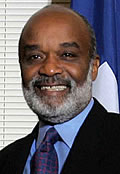this is good news mr preval! prevail sir!
< Previous | Home | Next >
Constitution Change?
Préval Proposes Overhauling Rules to Up Presidential Terms
Haitian Times Staff
After experiencing a string of dictators throughout its 200 years as a republic, Haitians are now weary of giving their president consecutive terms, as they voted in the Constitution in 1987.
But with the country reeling, a new school of thought has slowly emerged that elected officials, particularly the president, should be given longer terms.
That idea became more public last week when President René Préval called for a constitutional amendment to allow presidents to serve consecutive terms -- a change he said would bring more stability to a country frequently mired in political chaos.
Préval, in a speech at the National Palace, proposed overhauling the country's entire constitution to give the government more flexibility to promote development and fight corruption.
Advertisement
He suggested holding all national and local elections on the same day every five years, and recommended creating a constitutional court to interpret the nation's laws. He also said the president should have the power to dismiss the prime minister -- who is now appointed by the executive, but can only be ousted by parliament.
Current rules limit Haitian presidents to two terms, with at least a five-year break in between.
Préval's initial proposal, which spokesmen said he would refine before submitting to parliament, would allow future presidents to serve those terms back-to-back.
Préval, who won his second nonconsecutive term last year, assured legislators he could not, and would not, seek office again.
"I know that as soon as the president asks to reflect on the constitution, it gives rise to suspicion," Préval said. "I repeat once again for everyone: My tenure comes to end on Feb. 7, 2011, period."
Haiti's current constitution was signed in 1987 after 29 years of dictatorship and was intended to impede any return to authoritarian rule. That constitution many experts have argued was drafted at an extremely emotional moment in Haiti's history and feelings and not rule of law and common sense were guiding the articles.
"This was more against dictatorship, than a legal guide for an emerging country," said a person who was instrumental in drafting the Constitution who refused to have his name used for this article.
"We should have taken our time and hold public meetings to let people know what was in it and then ratify it. The process was hurried and we need to amend it."
Other people, particularly those in the Diaspora, take issues because there is no dual nationality clause in the Constitution.
They argue that they are sustaining the country economically with about $1 billion in remittances sent to relatives while they are denied the right to vote simply because they hold another country's passport.
This issue was raised before.
In 1996, President Jean-Bertrand Aristide wanted to run again for office arguing that the three year he spent in exile from 1991 to 1995, gave him the moral authority to run again.
Aristide reluctantly endorsed Préval to succeed him. Préval finished his term and Aristide was reelected during a contentious vote that eventually paralyzed his administration, leading to his inauspicious exile in Feb. 29, 2004 to South Africa where he now lives.
The country is still facing political uncertainty.
Recently, officials announced that legislative elections will be postponed as it sorts out allegations of financial fraud and criminal activity within the nation's electoral council.
The current Parliament was elected in 2006 after two dormant years in the wake of a 2004 uprising that toppled former President Jean-Bertrand Aristide, and 10 out of 30 Senate seats were supposed to be up for election in November.
Government spokesman Joseph Jasmin said the election "is certainly not going to happen in November." "I can't give you any estimate when it is going to happen but we will work so it can happen quickly."
The Provisional Electoral Council has long been criticized for votes plagued by ballot irregularities and fraud allegations.
Internal conflict reached a head when two members -- Patrick Fequiere and Louis Jerson Richeme -- accused commission President Max Mathurin, Secretary-General Rosemond Pradel and Treasurer Francois Benoit of embezzling an undisclosed amount of money for personal use and of trying to have Richeme killed.
"The (council) is broken in two. The members are fighting all the time," Jasmin said.
Unknown Flo And Linda Said I Am A Retard, October 25 2007, 10:28 PM
Start a NEW topic or,
Jump to
previous | Next Topic >
< Previous | Home | Next >
< Previous | Home | Next >

 Bill Clinton in Haiti Palais National
Bill Clinton in Haiti Palais National  Rene Preval and Fidel Castro
Rene Preval and Fidel Castro  Rene Preval and Peter MacKay
Rene Preval and Peter MacKay  Rene Preval and Condoleezza Rice
Rene Preval and Condoleezza Rice  Rene Preval and Congressman Hank Johnson
Rene Preval and Congressman Hank Johnson  Rene Preval and Georges W. Bush
Rene Preval and Georges W. Bush  Rene Preval and Leonel Fernandez
Rene Preval and Leonel Fernandez  President Rene Preval and Hillary Clinton
President Rene Preval and Hillary Clinton  Rene Preval and Dominique de Villepin
Rene Preval and Dominique de Villepin  Presidents Rene Preval, Raul Castro, Daniel Ortega, and Leonel Fernandez
Presidents Rene Preval, Raul Castro, Daniel Ortega, and Leonel Fernandez  Caribbean News From Caribworldnews
Caribbean News From Caribworldnews  Discour President Rene Preval Aux Gonaives 1er Janvier 2009
Discour President Rene Preval Aux Gonaives 1er Janvier 2009  Trinidad Obama Dissed Preval Nouvelle Tournure New Twist
Trinidad Obama Dissed Preval Nouvelle Tournure New Twist  Obama Dissed Preval In Trinidad Preval Pawol Tafia
Obama Dissed Preval In Trinidad Preval Pawol Tafia  President Fidel Castro Hosts Haiti President-elect Rene Preval
President Fidel Castro Hosts Haiti President-elect Rene Preval 

